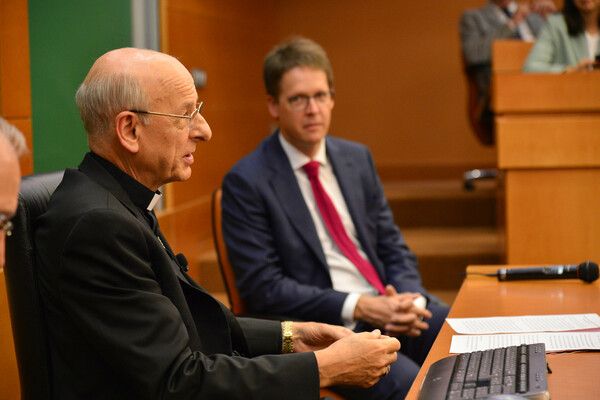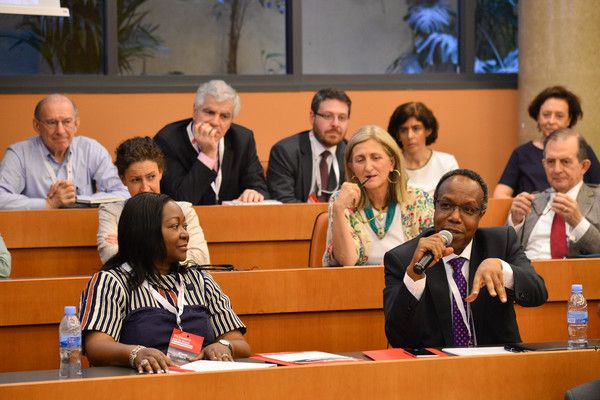The main reason for the Prelate's visit to Barcelona was to participate in a conference marking the 60th anniversary of IESE, the Business School of the University of Navarra. After the conference, he had an encounter with representatives from the 16 business schools associated with IESE, as well as several families. Finally, the Prelate was also able to meet with students and families from Bonaigua High School, following a tragic accident several weeks ago that took the life of one of their teachers, Theresa Cardona, while she was heading up a service project in Africa.
Saturday, July 6th. Meeting with families and representatives from the 16 Business Schools associated with IESE.
A meeting of families: parents, children, grandchildren and great-grandchildren
On Saturday morning, the Prelate met with a number of families. As usual, he asked everyone to assist the Pope with their prayers, and he also reminded them that "we are a very large family, open to everyone, in order to help spread the great joy of our Christian faith."
Luz told the Prelate that she encourages her children to take charge of their own lives, although it can be difficult at times, and she asked Monsignor Ocáriz about how to avoid wasting time. "Prayer is a simple way to achieve it and to have peace, because there are usually more things to do than time available." He also said that often it is just "a matter of order; with order, you can fit in more things."

It was the 50th wedding anniversary of the parents of one family, and one of their sons asked the Prelate to give him some "advice, so as to make it to 50 years of marriage like my parents have." Monsignor Ocáriz suggested "loving each other more, with each other's defects included. We have to love people the way they are."
Carlos asked how to make God present on his cell phone. Ocáriz offered a simple idea: "Put a picture on your home screen that helps you have more presence of God." At the same time, the Prelate recommended "using it with temperance" in daily life.
Many schools: one mission
The partner schools form a network sharing a single mission "forging human progress, not only in a material sense but also in a spiritual one," the Prelate said. All these schools share a common origin: IESE, which has also provided support for their development over the years.
Great news! For a record fifth year in a row, IESE has been ranked #1 in the world for executive education by the @FinancialTimes. #ProudofIESE #aMarktoMake https://t.co/zvLQgpPkg2 pic.twitter.com/rAxDQBz9jj
— IESE Business School (@iesebschool) June 3, 2019
During the meeting, professors and directors from these business schools shared experiences and stories about their daily work with managers and students, including the ways in which they try to share their Christian identity with others. In response, Monsignor Ocáriz offered a reflection on friendship: "Getting to know people one-on-on and treating people with affection: this is where spreading the Gospel lies." The Prelate also added that a "business school that seeks to be Christian must foster charity and also justice."
Leos, from the IHE-Afrique School in Ivory Coast, told the Prelate about how their program tries to help students see the importance of making work compatible with family duties. Next, Professor Ariño from IESE asked Monsignor Ocáriz how to find time for friendships when there are so many other urgent things to do. The Prelate replied: "When we realize that the most important thing is never the most urgent one, we know that urgent things can wait and very urgent ones must wait, as St. Josemaría said. Friendship is among the most important things in life, and we need to make the effort to devote time to it." Finally, Professor Chinchilla, also from IESE, spoke about an initiative called IWIL (IESE Women in Leadership) carried out with directors and businesswomen in Barcelona.

Luis Romera, Prefect of Studies for the Prelature of Opus Dei and coordinator of the meeting, thanked the participants for "all the social initiatives they carry out and that help better society. It is worthwhile to continue this work that helps so many people and spreads the Gospel."
Before leaving for New York (the next stop on his pastoral trip this summer), Monsignor Ocáriz found a few minutes to visit the Monterols Residence, which is where he lived when he was a student in Barcelona.
Friday, July 5th. IESE's 60th anniversary: "From the outset, IESE understood business as a community of people"
The business school of the University of Navarra, IESE, celebrated its 60th anniversary with a conference on "The Company and its Social Responsibilities". Monsignor Fernando Ocáriz, Chancellor of the University, was invited to give the inaugural lecture.
For the past 60 years, IESE Business School has equipped managers with values based on an ethical and humanistic approach to business. During its anniversary conference on Friday, participants reflected on the social, economic and technological changes that are causing many people to reconsider the roles and responsibilities of companies and managers, and the impact that management schools can have in this area.
IESE's Dean, Franz Heukamp, inaugurated the conference by welcoming participants, including former IESE students, managers, members of associated business schools, school employees, and people connected by video-conference from Madrid, New York and Munich, cities where IESE has satellite campuses. Heukamp expressed his gratitude towards former Chancellors Blessed Alvaro del Portillo and Bishop Echevarría, both of whom encouraged IESE to "contribute to the betterment of society," realizing "the importance of each person."
The primary task of executives
Monsignor Fernando Ocáriz, thanked the school for the invitation to the conference, and also thanked Saint Josemaría Escrivá for being "God's instrument to begin this initiative." He took his cue from the topic of the conference, saying, "Business is a community of people that serves other people within a society of people. Only after taking this reality into consideration do capital, facilities, technology and legal realities come into play."
Ocáriz also referred to the origins of IESE and the desire of Saint Josemaría to "improve the formation and the Christian life of so many people in Catalonia in charge of running many different kinds of businesses."
"What is the primary task of an executive?" Monsignor Ocáriz asked his listeners. "To convene, train, guide, demand from, encourage, nurture, and sometimes heal the human team that will carry out the company's activities... Hence the need for leaders to be very aware that every person is important, not only or mainly because of what he or she contributes to the company, but because of who each one is in themselves," he added.
What are an executive’s main responsibilities? Words of wisdom from our Grand Chancellor as we celebrate IESE’s 60th anniversary. #responsiblebusiness #aWorldtoChange #IESE60 #purpose pic.twitter.com/YUAIR2hxgb
— IESE Business School (@iesebschool) 5 luglio 2019
What distinguishes IESE
"Since that first management training program back in November 1958, IESE has undergone notable changes that have led to improved professional and personal results for the thousands of men and women who have benefitted from the mark left on society by IESE," Ocáriz said.
The Chancellor's address ended with a look to the future: "Much remains to be done: new generations reach your classrooms every day, your programs multiply, you are present in ever more countries, your research work receives well-deserved praise… But what distinguishes IESE is this constant reference to moral and ethical values. Always be faithful to this."
In the morning, before the conference, the Prelate held a meeting with directors of schools from the Institució Familiar d'Educació association, which is celebrating its 50th anniversary this year. He encouraged them to "spread the hope and joy found in the wellspring of the faith." As a keepsake, the association gave the prelate a "Fargalet", which is a figurine representing their students. They also granted him the title of "Honorary Professor."